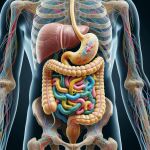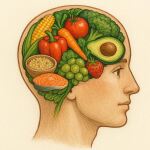Discover the Shocking Benefits of Plant Proteins
Discover the benefits of plant proteins: essential for repairing tissues, producing hormones, and promoting healthy aging. Get informed now!...
Table of Contents
- The Importance of Proteins in Health
- Differences Between Plant and Animal Proteins
- Benefits of Plant Proteins in Aging
- Recommendations and Conclusions
Follow Patricia Alegsa on Pinterest!
The Importance of Proteins in Health
Proteins are one of the fundamental pillars for the proper functioning of the human body. They act as the "building blocks" of cells, tissues, and organs, and are necessary for carrying out essential functions such as cellular repair, hormone production, muscle development, and enzyme regulation.
According to the site Medline Plus, from the National Library of Medicine of the United States, proteins are made up of chains of amino acids, which determine their specific structure and function.
A deficiency in proteins can lead to a series of health problems, including weakness, loss of muscle mass, and an acceleration of the aging process. Therefore, maintaining an adequate intake of proteins is crucial for quality of life and long-term health.
The key difference between plant-based and animal proteins lies in their amino acid composition. Animal proteins, such as those found in meat, eggs, or dairy, are considered "complete" because they contain all nine essential amino acids that the body cannot produce on its own. On the other hand, many plant proteins are not complete on their own, as they lack some of these essential amino acids.
However, by consuming a variety of plant foods such as legumes, grains, and nuts throughout the day, it is possible to obtain all the amino acids the body needs. Additionally, plant proteins are often easier to digest for some people and are typically accompanied by other valuable nutrients such as fiber, vitamins, and antioxidants, which adds extra value compared to animal proteins.
As people age, the loss of muscle mass and the increase of chronic diseases are common concerns. Various studies, such as the one conducted by Tufts University, have shown that consuming an adequate amount of protein can significantly improve health during old age.
A deficiency in proteins can lead to a series of health problems, including weakness, loss of muscle mass, and an acceleration of the aging process. Therefore, maintaining an adequate intake of proteins is crucial for quality of life and long-term health.
Differences Between Plant and Animal Proteins
The key difference between plant-based and animal proteins lies in their amino acid composition. Animal proteins, such as those found in meat, eggs, or dairy, are considered "complete" because they contain all nine essential amino acids that the body cannot produce on its own. On the other hand, many plant proteins are not complete on their own, as they lack some of these essential amino acids.
However, by consuming a variety of plant foods such as legumes, grains, and nuts throughout the day, it is possible to obtain all the amino acids the body needs. Additionally, plant proteins are often easier to digest for some people and are typically accompanied by other valuable nutrients such as fiber, vitamins, and antioxidants, which adds extra value compared to animal proteins.
Benefits of Plant Proteins in Aging
As people age, the loss of muscle mass and the increase of chronic diseases are common concerns. Various studies, such as the one conducted by Tufts University, have shown that consuming an adequate amount of protein can significantly improve health during old age.
Plant proteins play a fundamental role, as they not only help preserve muscle mass but are also associated with lower risks of cardiovascular diseases, diabetes, and cognitive decline, all common issues among older adults.
The advantage of plant-based proteins over animal proteins in this age group is that the former are associated with lower saturated fat content, which reduces the risk of heart disease. Additionally, plant proteins are easier to digest for some older adults, making it easier to incorporate them into the daily diet.
The Spanish Society of Dietetics and Food Sciences (SEDCA) recommends that at least 50% of the daily total protein comes from plant sources.
The advantage of plant-based proteins over animal proteins in this age group is that the former are associated with lower saturated fat content, which reduces the risk of heart disease. Additionally, plant proteins are easier to digest for some older adults, making it easier to incorporate them into the daily diet.
Recommendations and Conclusions
The Spanish Society of Dietetics and Food Sciences (SEDCA) recommends that at least 50% of the daily total protein comes from plant sources.
Plant proteins offer a series of additional benefits, such as improving digestion and regulating blood sugar levels, thanks to their fiber and antioxidant content. They also help maintain low cholesterol levels and blood pressure, contributing to cardiovascular health.
In conclusion, proteins, whether of plant or animal origin, are essential for maintaining health and the proper functioning of the body. Including a variety of foods rich in plant proteins ensures complete and balanced nutrition, thereby contributing to overall well-being throughout life and promoting healthy aging.
In conclusion, proteins, whether of plant or animal origin, are essential for maintaining health and the proper functioning of the body. Including a variety of foods rich in plant proteins ensures complete and balanced nutrition, thereby contributing to overall well-being throughout life and promoting healthy aging.
It is advisable to consult a doctor or nutritionist if symptoms of protein deficiency occur, in order to adapt the diet to individual needs.
Subscribe to the free weekly horoscope
Aquarius Aries Cancer Capricorn Gemini Leo Libra Pisces Sagittarius Scorpio Taurus Virgo
-
 The hidden function of your washing machine that saves energy and cares for your clothes
The hidden function of your washing machine that saves energy and cares for your clothes
Discover the hidden function of the washing machine that saves up to 50% energy and ensures clean clothes. Optimize your consumption and take care of your wallet! -
 Goodbye antibiotics! Vaccines and bacteria ally in your gut
Goodbye antibiotics! Vaccines and bacteria ally in your gut
A revolution in the gut! Oral vaccines and good bacteria join forces to fight infections without antibiotics. Goodbye, pills; hello, natural health. -
 Discover the fruit rich in Vitamin D, excellent for your bone health
Discover the fruit rich in Vitamin D, excellent for your bone health
Discover the fruit that shines in vitamin D, crucial for your bones and well-being. Beyond the sun and fish, this delight will surprise you. -
 Insomnia and Academic Performance: Impact on Children and Adolescents
Insomnia and Academic Performance: Impact on Children and Adolescents
Discover how insomnia impacts academic performance in children and adolescents, affecting concentration, memory, and mood. Learn more here! -
 The Pothos Plant: The Magnet for Good Energy Your Home Needs
The Pothos Plant: The Magnet for Good Energy Your Home Needs
Discover the plant that attracts good energy and prosperity: easy to care for, hardy, and perfect for your home. Learn its secrets and how to grow it.
I am Patricia Alegsa
I have been writing horoscope and self-help articles professionally for over 20 years.
Subscribe to the free weekly horoscope
Receive weekly in your email the horoscope and our new articles on love, family, work, dreams and more news. We do NOT send spam.
Astral and numerological analysis
-
 Discover your future, secret personality traits and how to improve in love, business and life in general
Discover your future, secret personality traits and how to improve in love, business and life in general
-
 Online Dream Interpreter: with artificial intelligence
Do you want to know what a dream you had means? Discover the power of understanding your dreams with our advanced online dream interpreter using artificial intelligence that responds to you in seconds.
Online Dream Interpreter: with artificial intelligence
Do you want to know what a dream you had means? Discover the power of understanding your dreams with our advanced online dream interpreter using artificial intelligence that responds to you in seconds.
-
 The German technique to sleep better and reduce stress in minutes: Lüften
The German technique to sleep better and reduce stress in minutes: Lüften
Discover Lüften, the German habit that reduces stress in minutes, boosts your mood, and prepares you for deep sleep. Breathe, renew, and rest, according to GQ. -
 Exercise vs. Alzheimer's: Discover the sports that protect your mind!
Exercise vs. Alzheimer's: Discover the sports that protect your mind!
Did you know that exercising regularly can reduce the risk of Alzheimer's by 20%? Even 'weekend warriors' benefit! Which sport do you prefer? -
 Why is it so difficult to lose abdominal fat?
Why is it so difficult to lose abdominal fat?
I give you some tips that will help you lose abdominal fat and show a better figure. -
 Brain Diet: 7 Foods Against Dementia and Cognitive Decline
Brain Diet: 7 Foods Against Dementia and Cognitive Decline
Brain Diet: 7 Foods That Protect Your Memory and Prevent Cognitive Decline and Dementia. Experts Reveal Key Habits in Midlife. -
 Best times to consume foods that care for your heart and digestion
Best times to consume foods that care for your heart and digestion
Discover how including them in your diet improves cardiovascular health. Learn the best time to consume them and prevent constipation. Get informed now! -
 The heatwaves and pregnancy: the care you should take
The heatwaves and pregnancy: the care you should take
Pregnant women should take special care in the face of the heatwaves that are occurring in different parts of the world. We spoke with an expert. -
 Ultra-processed foods could trigger early signs of Parkinson’s
Ultra-processed foods could trigger early signs of Parkinson’s
Do you eat a lot of ultra-processed foods? A study says that 11 servings a day could trigger the first symptoms of Parkinson’s. Do you dare to count yours? -
 What does it mean to dream of a farewell?
What does it mean to dream of a farewell?
Discover the meaning behind your goodbye dream and how it can affect your life. Find tips and reflections to overcome sadness and move on. -
 What does it mean to dream of a cliff?
What does it mean to dream of a cliff?
Discover the true meaning of dreaming of a cliff in this article. Get advice and guidance to make wiser decisions in your life, dare to explore your subconscious and reach your goals with confidence! -
 The quince: the fruit that is rarely consumed, but very rich in nutrients
The quince: the fruit that is rarely consumed, but very rich in nutrients
Rich in tannins and vitamin C, this option strengthens your immune system and protects the skin, providing multiple health benefits. -
 What does it mean to dream of statues?
What does it mean to dream of statues?
Discover the hidden meaning behind your dreams with statues - do they represent your goals and ambitions or your fears and anxieties? Read our article to find out more! -
 The Mediterranean spice that improves your health
The Mediterranean spice that improves your health
Discover this essential spice of Mediterranean cuisine, rich in beneficial compounds. Easily incorporate it into your daily diet and improve your health! -
 What does it mean to dream of kangaroos?
What does it mean to dream of kangaroos?
Discover the fascinating world of kangaroo dreams. What does it mean to dream of these jumping animals? Discover their symbolism and their message for you.